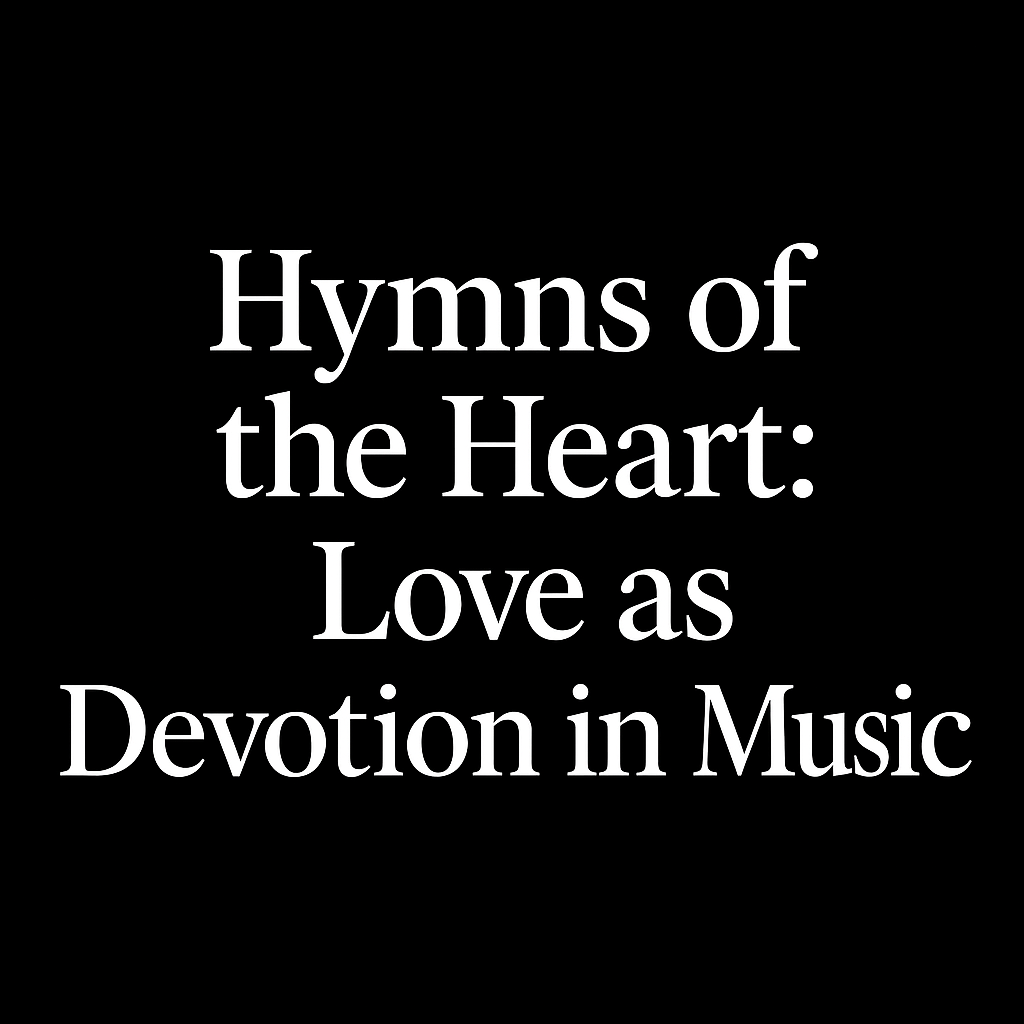Hymns of the Heart: Love as Devotion in Music

When you really listen, many of our most beloved love songs sound less like confessions of romance and more like prayers. Pop lyrics are drenched in sacred metaphors: “heaven,” “hallelujah,” “angel,” “saviour.” Jeff Buckley once sang that in love, “love becomes a kind of god.” Beyoncé saw the divine in her partner’s “halo.” Madonna collapsed the boundaries completely, turning Like a Prayer into a scandalous hymn of erotic worship.
Lately, I've been asking myself the question: what does this language really do? On one hand, it can elevate romance to the level of devotion, a way of saying that to love and be loved is to brush against the divine. On the other hand, it some might say it risks trivializing faith, reducing centuries of religious imagery into metaphors for attraction or heartbreak. And maybe, beyond both, it points to something deeper: in an increasingly secular world, we still hunger for transcendence, and we now search for it in each other.
Modern songwriting is saturated with worshipful tones. Buckley’s gut-wrenching Lover, You Should’ve Come Over aches like a psalm, framed in the language of salvation. Beyoncé’s Halo wraps her lover in angelic light, as if he were heaven itself. And Madonna’s Like a Prayer entwines sexual longing with Catholic imagery. As she once explained, it’s about a girl “so in love with God that it is almost as though He were the male figure in her life.”
Yet this overlap is far from neutral. For some, Madonna’s burning crosses and saintly kiss blurred the lines between ecstasy and blasphemy, and the Vatican condemned it as “a profane use of Christian imagery.” Was it worship through love, or mockery through desire? That tension remains unresolved. Pop ballads give us both, reverence so intense it borders on sacrilege.
Of course, this isn’t new. Long before radio, novelists cast love in divine terms. In Jane Eyre, Brontë frames Jane’s bond with Rochester as if “we stood at God’s feet, equal, as we are.” Rochester calls her “unearthly,” as though she is both flesh and spirit. Emily Brontë intensifies this in Wuthering Heights, where Heathcliff declares he “cannot live without [his] soul,” equating Catherine with his very existence.
Victor Hugo makes the link explicit in Les Misérables: “To love another person is to see the face of God.” Jean Valjean ends the novel insisting that true human love is itself divine grace. If modern pop collapses church and bedroom, the Brontës and Hugos of literature already prepared the ground.
Some artists lean into this overlap deliberately. Prince’s I Would Die 4 U casts him as both lover and Christlike figure, offering himself as sacrifice.
One of my favourite artists of all-time Florence Welch, of Florence + the Machine, makes this collision her signature. In Free she sings, “Like Christ up on a cross… I give it all away,” surrendering herself as if devotion were crucifixion. In Big God she laments, “You need a big god, big enough to hold your love,” a plea that feels both romantic and liturgical. Even in Never Let Me Go (probably my favourite song of all time) she evokes baptismal release: “All this devotion was rushing out of me.” Love, for Florence, is ritual. It is sacrifice, salvation, liturgy.
Hozier does something similar, though with a darker edge. Take Me to Church reimagines religion as intimacy, pleading: “I’ll worship like a dog at the shrine of your lies.” But across his work, the theme recurs. In Work Song he promises, “No grave can hold my body down, I’ll crawl home to her,” a resurrection narrative in service of devotion. In NFWMB he pledges violent loyalty: “Fuel the pyre of your enemies.” His romances carry both gospel weight and apocalyptic fervour, as if love itself is the only altar worth kneeling at.
Nowhere are these echoes louder than in gospel and soul. Al Green’s lush ballads and later gospel work make little distinction between earthly and heavenly devotion. Whitney Houston’s soaring I Will Always Love You carries the weight of a hymn, her vocal purity reverent as much as romantic. Boyz II Men’s End of the Road feels like a prayer of heartbreak, its harmonies as tender as any church choir. There are so many old school R&B songs that could easily be mistaken for gospel songs and vice versa.
Sometimes the overlap was literal back then. R&B and gospel shared the same musical grammar of longing. Kirk Franklin’s crossover hits praised both God and earthly love in the same breath. The sacred and the secular didn’t just touch, they sang in unison.
But again, the counterpoint. If every ballad sounds like a hymn, do hymns lose their gravity? For believers, this risks confusing devotion to God with devotion to lovers. For others, it simply shows that both longings come from the same well, the ache for transcendence.
In recent years, more and more artists have leaned into this religious language to capture the force of human love. Think of the latest offering from Abel/The Weeknd; seeking purification, the move signals something bigger. Pop and indie artists are reaching for the sacred to express the ineffable pull of intimacy.
On Hurry Up Tomorrow, Abel/The Weeknd sings as if torn between confession, prayer, and desire. In Baptized in Fear he admits, “I’ve been the chief of sin,” casting himself as both sinner and penitent. On the title track, he begs for purification: “Wash me with your fire… who else has to pay for my sins?” It could be a gospel hymn or a lover’s desperate plea for renewal.
Even in Without a Warning he folds devotion into doubt: “How do I know tomorrow’s coming, especially when I always chase the high?” A confession that feels part addict’s psalm, part breakup song. Is he speaking to God, to a lover, or to both? The ambiguity is the point. Like Florence and Hozier, he collapses the sacred and the secular until they are indistinguishable.
On one hand, these metaphors elevate love. They suggest that romance, at its highest, can brush against the same awe we once reserved for altars and sanctuaries. To fans, this feels like reverence, a reclaiming of spiritual language for deeply human connection.
But the other hand is thornier. One can argue that repurposing sacred symbols risks trivializing faith. Florence’s Marian imagery might strike some as profane. Hozier’s biblical cadences can feel like blasphemy dressed as poetry. What feels like reverence to one ear sounds like desecration to another.
And yet, the deeper question lingers. Why this hunger for transcendence in secular times? Perhaps the collapse of organized religion has not erased our need for ritual and awe. It has only displaced it. Lovers become gods not because artists are mocking faith, but because faith-shaped language still carries unmatched weight for longing.
But then again, if everything is sacred, is anything sacred? When every chorus crowns a lover as salvation, does the word “salvation” lose its edge?
Whether in pop lyrics or classic novels, gospel choirs or rock anthems, the language of love keeps drifting into the language of worship. Sometimes it exalts love as sacred. Sometimes it cheapens faith into metaphor. But either way, it reveals something elemental. We long to be saved, to be made whole, to be known beyond ourselves.
Maybe that is why, even in a world where religion’s authority fades, music can still feel like mass. The chorus becomes a sanctuary. The song becomes a psalm. And maybe, when the next love song swells and your heart leaps, you are not just hearing a ballad. You are hearing a hymn in disguise.






